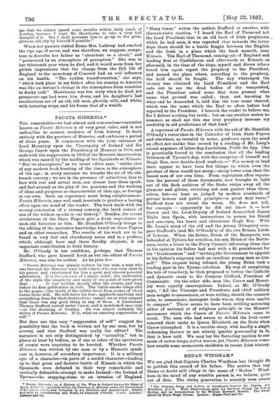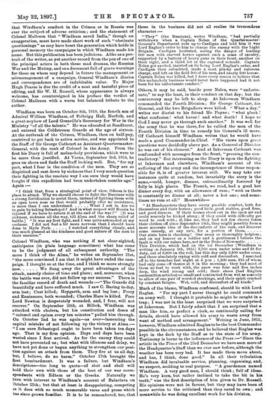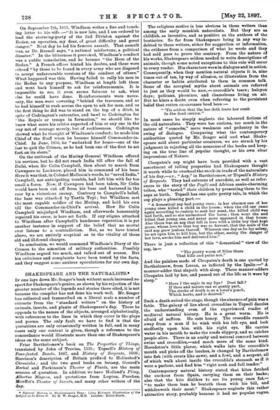REDAN WINDHAM.* WE are glad that Captain Charles Windham has
thought fit to publish this record of his father. The notion that any blame or doubt still clings to the name of " Redan " Wind- ham in the mind of any sensible person is, we believe, quite out of date. The rising generation is scarcely even aware
• The Crimean Diary and Letters of Lieutenant General Sir Charles Ash Windham, H.C.B. With Observations upon his Services daring the Iodntn Mutiny, and an Introduction by Sir William Howard Russell. The whole edited by Major Hugh rearm London : Regan Paul and Co.
that Windbam's conduct in the Crimea or in Russia was ever the subject of adverse criticism ; and the statement of Colonel Malleson that " Windham saved India," though an exaggeration, must have made short work of such " obstinate questionings" as may have beset the generation which holds in personal memory the campaigns in which Windham made his name. But this publication has been judicious. Alike as a por- trait of the writer, as yet another record from the pen of one of the principal actors in both those mad dramas, the Russian War and the Mutiny, and as a document full of grave warnings for those on whom may depend in future the management or mismanagement of a campaign, General Windbam's diaries and correspondence are of indubitable value. To Major Hugh Pearse is due the credit of a neat and tasteful piece of editing, and Sir W. H. Russell, whose appearance is always welcome, has countersigned in his preface the verdict of Colonel Malleson with a warm but balanced tribute to the author.
Windham was born on October 8th, 1810, the fourth son of Admiral William Windham, of Felbrigg Hall, Norfolk, and a great-nephew of Lord Grenville's Secretary for War in the Ministry "of all the talents." He was educated at Sandhurst, and entered the Coldstream Guards at the age of sixteen. At the outbreak of the Crimea, Windham, then on half-pay, contrived to get back to active service, and was appointed to the Staff of Sir George Cathcart as Assistant-Quartermaster- General, with the rank of Colonel in the Army. From the first his Diary is full of melancholy previsions, which were to be more than justified. At Varna, September 3rd, 1854, he goes on shore and finds the Staff looking well. But, "for my part, what I fear is the condition of the men. They are so dispirited and cast down by sickness that I very much question their fighting in the resolute way I am sure they would have fought if this expedition had been undertaken months ago." Again :-
" I think that, from a strategical point of view, Odessa is the place to attack. Why we should choose to fight the Russians with a strong fortification to assist them, instead of fighting them with an open town near us that would probably offer no resistance, is more than I can understand What I ask is, Are we to gain by taking Sebastopol ? And in what respect will Russia be injured if we have to return it at the end of the war ?" [It was sickness, sickness all the way, till Alma and the sharp relief of battle.] " It was my first fight, and I was quite astounded at my coolness. I did not feel a bit more nervous than I should have
done in Hyde Park I watched everything closely, and was much pleased at the kindness and good nature of the men to their enemies."
Colonel Windham, who was nothing if not clear-sighted, anticipates (in plain language sometimes) what has come
to be the judgment of all subsequent authority. "The more I think of the Alma," he writes on September 21st, " the more convinced I am that it might have ended the cam- paign. I thought so at the time, and I think so more strongly now We flung away the great advantages of the attack, namely choice of time and place ; and, moreover, when the battle was over, did not follow up our success." There is the familiar record of death and wounds :—" The Guards did beautifully and have suffered much. I saw C. Baring to-day, arm lost ; Cast killed; Heygarth, arm and leg lost ; Percy and Ennismore, both wounded; Charles Hare is killed. Poor Lord Newton is desperately wounded, and, I fear, will not recover." On September 26th, at Bilbek, Windham was attacked with cholera, but his constitution and doses of " calomel and opium every ten minutes " pulled him through. On October 2nd he was again—as ever—lamenting the capital mistake of not following up the victory at Alma :— " I am sure Sebastopol ought to have been taken ten days ago. That is my firm opinion. Days and days have been wasted since I first arrived. As for the enemy they could not have prevented us ; but what with idleness and delay, we have not yet done or begun anything to strengthen our posi- tion against an attack from them. They fire at us all day, but, I believe, do no harm." October 17th brought the first bombardment. It was a failure, but Windham's descriptions—too long to quote—of shot and shell will hold their own with those of the best of our war corre- spondents with Edhem or the Greeks. Naturally we turn with interest to Windham's account of Balaclava on October 25th; but that at least is disappointing, competing is it does with so much memorable verse and prose which has since grown familiar. It is to be remembered, too, that those in the business did not all realise its tremendous character :-
"They" (the Russians), writes Windham, " had partially withdrawn when a Captain Nolan of the Quartermaster- General's Department rode up to Cardigan and told him it was Lord Raglan's order to him to charge the enemy with the Light Brigade. Cardigan hesitated, seeing the danger of leading 600 men with starved horses against such a mass of cavalry,. supported by a battery of heavy guns in their front, another on their right, and a third lot in the captured redoubt. Captain Nolan got excited, insisted on its being Lord Raglan's order, and Cardigan then submitted, made a most plucky and valorous
charge, and left on the field 300 of his men, and nearly 500 horses Captain Nolan was killed, but I have every reason to believe that this melancholy business would never have happened had it not been for his unfortunate conduct."
Others, it may be said, beside poor Nolan, were "unfortu-
nate," to say the least, in their conduct on that day ; but the controversy may be left to sleep. At Inkerman Windham commanded the Fourth Division ; Sir George Cathcart, his General, and the two Brigadiers were killed. "What a day," writes our diarist to his friend Mr. Payne ; " what pluck what confusion ! what havoc ! and what death ! I hope to God I may never go through such another." It was well for the army that he was there, for he rallied the men of the Fourth Division in time to remedy his General's ill move_ Of Cathcart himself Windham writes that he would have made a good Commander-in-Chief. " His views upon grit
questions were decidedly above par. As a General of Division he was out of his element." And at Inkerman Cathcart was.
confounded with messages from the front, " pressing the con- tradictory." But interesting as the Diary is upon the fighting, at Inkerman and elsewhere, Windham's account of the suffering of the army and the incompetence of those respon- sible for it, is of greater interest still. We may take our instances quite at random, but invariably the story is the same,—cold, hunger, disease, extraordinarily fostered by folly in high places. The French, we read, had a good hot dinner every day, with an allowance of rum ; " with us there is constantly no dinner at all; never a hot one ; and some- times no rum at all." Meanwhile-
" At Headquarters they have every possible comfort, both for themselves and their horses ; good be ls, good stables, good fires, and good dinners. If their horses stood out in the open air and could scarcely be kicked along ; if they could with difficulty get wood to cook with ; if, like me, they had not (on shore) taken their clothes off since September 14th, they might possibly form a more accurate idea of the discmiforts of the men, and discover some remedy, at any rate, for a portion of them. Our state here is shocking ! Our army so thoroughly helpless; and on my honour as a soldier and a gentleman I believe the fault is with our rulers here, not in the Duke of Newcastle This Division, which had on the 1st December [Windham is writing on January 5th, 1855] 3,760 men under arms and fit for duty, out of 6,800 on the roll, has this day only 2,500 under arms, and these absolutely crying with cold and discomfort. I marched off to the trenches last night at 5 p.m ; 1,200 men, 315 of whom had only come off thence at 8 in the morning ; they had most of them no fuel to work with, the snow was four and five inches deep, the wind strong and cold ; their shoes (bad English ammunition articles) so small and contracted from wet as scarcely to allow of one pair of worsted stockings, and their spirit crushed by constant fatigue. Wet, cold, and discomfort of all kinds."
Much of the blame, Windham confessed, should lie with Lord Raglan. " For my part I never thought he could command an army well. I thought it probable he might be caught in a trap ; I was not in the least surprised that we were surprised at Inkerman. But I fairly admit that I am surprised that a man like him, so perfect a clerk, so continually calling for
details, should have allowed his army to waste away from want of method and arrangement." Writing in June, 1855,. however, Windham admitted Raglan to be the best Commander possible in the circumstances, and he believed that Raglan was kept in the dark by the Staff as to the state of his army. Testimony is borne to the influence of the Press :—" Since the article in the Times of the 23rd December we have seen more of the Headquarter's Staff than we ever saw before, although the- weather has been very bad. It has made them move about, and has, I think, done good." In all their tribulation Windham did invaluable service, planning, organising, and, we suspect, scolding to real purpose. " A guardsman named Windham. A very good man, I should think ; full of ideas_ He's very keen, but rather inclined to take the bit in his teeth," was the first description of him given to Dr. Russell. His opinions were not in favour, but they may have been of more service to the criticised than they cared to own ; and meanwhile he was doing excellent work for his division.
On September 7th, 1855, Windham writes a fine and touch. ing letter to his wife :—" It is now late, and I am ordered to lead the storming-party of the 2nd Division against the Redan, an operation, my dear, of great difficulty and great danger." Next day he led his famous assault. That assault was, as Dr. Russell says, " a national misfortune, a political disaster." In the bitterness it provoked, Windham's conduct was a public consolation, and he became " the Hero of the Redan." A French officer hinted his doubts, and these were echoed "by those to be found in every army who are disposed to accept unfavourable versions of the conduct of others." What happened was this. Having failed to rally his men in the Redan to any purpose, Windham at length left them and went back himself to ask for reinforcements. It is impossible to see, it even seems fatuous to ask, what else be could have done. Reinforcements were neces- sary, the men were cowering " behind the traverses, and as he had himself to rush across the open to ask for men, and as the first thing he did was to stand on the top of a ditch, in spite of Codrington's entreaties, and bawl to Codrington for " the Royals or troops in formation," we should like to know what more his critics expected of him or any one in the way not of courage merely, but of recklessness. Codrington showed what he thought of Windham's conduct; he made him Chief of the Staff when he became himself Commander-in- Chief. In June, 1856, he "embarked for home—one of the last to quit the Crimea, as he had been one of the first to set foot on its shore."
On the outbreak of the Mutiny General Windham offered his services, but he did not reach India till after the fall of Delhi, when Sir Colin Campbell, then about to march from Cawnpore to Lucknow, placed him in command of his base- Here it was that, in Colonel Malleson's words, he "saved India." Campbell, not anticipating trouble, had left him with far too small a force. Now, if Cawnpore had been taken, Sir Colin would have been cut off from his base and harassed in the rear by a victorious enemy. Contrary to Campbell's belief, the base was attacked by Tantia Topi ; but Windham met the most capable soldier of the Mutiny, and held his own till the Commander-in-Chief's arrival. How Sir Colin Campbell misjudged Windham, and afterwards honourably repaired his error, is here set forth. If any stigma attached to Windham after Campbell's handsome reparation it is yet another instance in support of the belief that no mortal ever listens to a contradiction. But, as we have hinted above, we are entirely sceptical as to the vitality of these old and ill-found charges.
In conclusion, we would commend Windham's Diary of the Crimea to the attention of military authorities. Possibly Windham argued too much, and talked out of season. Bat his criticisms and complaints have been tested by the facts, and they suggest some anxious speculations for our own day.








































 Previous page
Previous page